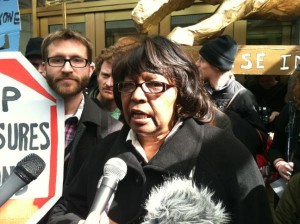Listen to Bertina Jones, Rooj Alwazir and Rev. Graylan Hagler:
Audio clip: Adobe Flash Player (version 9 or above) is required to play this audio clip. Download the latest version here. You also need to have JavaScript enabled in your browser.
“Can you hear me now?” Bertina Jones asked Monday at a demonstration outside the downtown office of Freddie Mac. Despite its pending seizure of her home in Prince George’s County, Jones has found the government-backed mortgage lender difficult to reach. But after Monday’s protest, which shut down its Seventh Street NW office, Freddie Mac seems eager to listen to this grandmother.
An hour after the demonstration, spokesman Brad German told the Washington Post that Freddie Mac was looking for a “positive resolution” to Jones’ situation. The merits of the case, not the boisterous action organized by Occupy Our Homes DC, prompted Freddie Mac’s sudden change of heart, explained German.
While activists with Occupy DC are hopeful that Freddie Mac will renegotiate Jones’ mortgage, they’re prepared to take action if things don’t work out. “If they are trying to evict her, we’re literally going to use our bodies as shields, and Bertina Jones is down as well,” Rooj Alwazir, an organizer with Occupy Our Homes DC, told TheFightBack.
“I did everything that Freddie Mac asked me to do,” Jones said at an impromptu press conference held outside the building entrance, now closed and guarded by police. “These banks… make you think that they’re going to work with you and they’re going to modify loans, but really they aren’t. It’s a shame. It’s a deception. We bailed them out with our taxpayers’ money and they never tried to help any of the homeowners.” ![]()
In 2008, Jones was unemployed for several months and fell behind on her mortgage. Bank of America agreed to renegotiate her mortgage, but then repeatedly lost her paperwork, Jones said. In 2010, Bank of America foreclosed on her home, which it then sold to Freddie Mac later that year.
In a letter to Senators Barbara Mikulski and Ben Cardin, as well as Rep. Steny Hoyer, Legal Aid Bureau of Maryland, which is assisting but not representing Jones, wrote, “This foreclosure was unnecessary and was caused by Bank of America’s loss of documents and inattention to the process.”
“We’re here to say enough is enough,” Rev. Graylan Hagler, senior minister at Plymouth Congregational United Church of Christ, told protesters surrounding the back door entrance to the building. “You’ve got Freddie Mac, a government sponsored enterprise… [which has] demonstrated that they are willing to allow homeowners to be thrown on the street without any care, without any concern, and we’re going to stand here keeping this building closed.”
Shortly afterwards, Jones and Rev. Hagler, who along with the other protesters had been barred from entering the building, were invited up to meet with Freddie Mac.
Following the meeting, Jones told reporters, “I’m not an icon, by no means. I’m just a homeowner trying to save her home.” There are many like her, particularly in Prince George’s County, which is majority African American.
“Other homeowners need to come down and stand up and be counted, especially in the PG [where] they have been hard hit,” Jones said. “Do I think it’s racial? No. But most of the people in PG are black and they’re just taking our wealth. That’s all that I have is a house. I’m not Romney [with] a daddy with money. I’ve worked for everything I have.”

